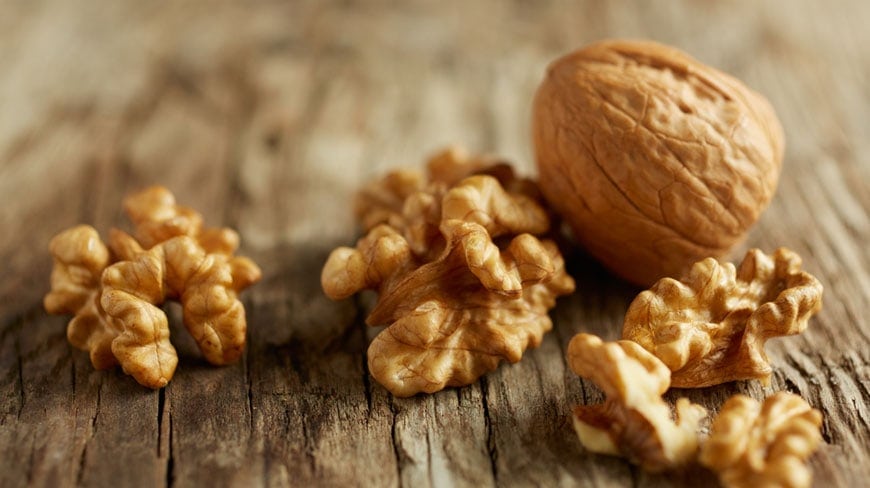Read more about the association of walnut consumption and type 2 diabetes!
Walnut consumption is associated with lower risk of type 2 diabetes in women1 published in the Journal of Nutrition. Dr. Frank Hu and colleagues from the Harvard School of Public Health share, utilizing the Nurses’ Health Study (NHS) and NHS II, "Our results suggest that higher walnut consumption is associated with a significantly lower risk of type 2 diabetes in women." The study looked at participants who consumed one to three servings per month, one serving per week, and more than two servings per week compared to women who never or rarely consumed walnuts.
The paper, The ability of walnut extract and fatty acids to protect against the deleterious effects of oxidative stress and inflammation in hippocampal cells2, published recently in Nutritional Neuroscience, focuses on the Omega-3 content of walnuts and the possible benefits in protecting against age-related cellular dysfunction. This animal model cognitive study is from Dr. Barbara Shukitt-Hale and her research team from the Neuroscience Lab USDA, HNRCA at Tufts University, and the results are indicators that are used as background to formulate hypotheses for other studies.
In this review paper, α-Linolenic acid and risk of cardiovascular disease: a systematic review and meta-analysis3, An Pan, PhD, of Harvard School of Public Health found that "In observational studies, higher ALA exposure is associated with a moderately lower risk of CVD. The results were generally consistent for dietary and biomarker studies but were not statistically significant for biomarker studies. However, the high unexplained heterogeneity highlights the need for additional well-designed observational studies and large randomized clinical trials to evaluate the effects of ALA on CVD."
A comparison of Mediterranean-Style and MyPyramid Diets on weight loss and inflammatory biomarkers in postpartum breastfeeding women4 was published in the Journal of Women’s Health. Dr. Stendall-Hollis of the University of Arizona found that, "Both diets support the promotion of postpartum weight loss and reduction in inflammation (TNF-α) in breastfeeding women". Walnuts were included in the Mediterranean-style diet.
Health Professional Conferences
At the annual meeting of the International Society for Nutraceuticals & Functional Foods (ISNFF) in Kona, over 300 international researchers and scientists convened to discuss recent findings in many areas including whole foods research. Dr. Joan Sabaté of Loma Linda University presented twice, Walnuts: Effects on cardiovascular biomarkers and Walnuts consumption and evidence to support the role in chronic illness risk reduction and disease prevention both of which generated much discussion.
The California Walnut Commission was proud to be the premiere nut sponsor of the 6th International Congress on Vegetarian Nutrition held in Loma Linda in February 2013. The congress which is held only once every five years focuses on the health effects of plant based diets. Health professionals, researchers, students and the public attended to advance their knowledge in vegetarian nutrition. Many of the presenters shared current findings on walnut research including Dr. David Jacobs, Dr. Frank Hu and of course Dr. Miguel Angel Martinez who spoke to the New England Journal of Medicine PREDIMED publication which was announced at a press conference during the Congress. Over 700 attendees came by the California Walnut Commission booth to pick up samples, the latest research and nutrition education tools and materials.
Dr. Frank Hu of the Harvard School of Public Health was the keynote speaker at the German Nutrition Society meeting in Bonn Germany. His presentation, Gene-diet interactions and risk of obesity and diabetes received positive feedback. In addition, Dr. Hu spoke at a breakout session, "Walnut consumption and risk of diabetes: Two prospective cohort studies," where he discussed recent walnut publications as well as an overview of the New England Journal of Medicine landmark PREDIMED paper. The California Walnut Commission also had exhibits at both meetings where samples and nutrition education materials were shared with over 600 attendees.

